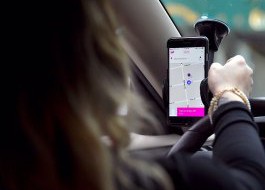 Uber CEO Travis Kalanick.REUTERS/Adnan Abidi
Uber CEO Travis Kalanick.REUTERS/Adnan Abidi
Eight years ago, Travis Kalanick launched a startup called UberCab in San Francisco.
Now, Uber is a global behemoth and one of Silicon Valley's most successful companies — and one of the most contentious.
Uber operates in nearly 600 cities worldwide, and it's said to be worth nearly $70 billion. The 40-year-old Kalanick is now said to have a net worth of more than $6 billion.
But Uber — and Kalanick — have been caught up in one scandal after another in recent months, calling into question the future of the world's most valuable startup.
Here's how Kalanick got his start and built Uber into a global empire.
Maya Kosoff contributed to an earlier version of this post.
Uber CEO Travis Kalanick grew up in Northridge, California — a suburb outside Los Angeles. When he was a kid, he wanted to be a spy.

Source: Business Insider
Kalanick got good grades and was athletic growing up, running track and playing football. But he was bullied by older students, and later vowed that he'd never be pushed around by anyone again.

Source: The New York Times
Kalanick would eventually follow in the entrepreneurial footsteps of his mom, a retail advertiser: He went door-to-door as a teen, selling knives for Cutco. He then started his first business at 18, an SAT-prep course called New Way Academy.

Source: Business Insider
Kalanick's parents, Donald and Bonnie, would be "rider zero" when Uber launched in Los Angeles.
Souce: Instagram
Kalanick went to UCLA to study computer engineering. He would drop out in 1998, but with good reason...

Source: Business Insider
...to work on Scour, a peer-to-peer search engine, with classmates Michael Todd and Vince Busam.

Source: Business Insider
Kalanick collected unemployment while working full-time for Scour, which was run on angel funding obtained by one Scour cofounder's friends and family.

Source: Business Insider
After being sued by several entertainment companies to the tune of $250 billion, Scour filed for Chapter 11 bankruptcy.

Source: Business Insider
Kalanick rebounded with Red Swoosh, a networking-software company. But he clashed with his new cofounder, Scour cofounder Michael Todd. Between the post-9/11 stock market crash, the company's pushing of legal boundaries by reinvesting its employees' income taxes back into the startup, and a final falling-out between the cofounders, Red Swoosh almost never made it to exit.

Source: Business Insider
But things improved. Kalanick moved back into his parents house and raised more funding. In 2007, Kalanick sold Red Swoosh to Akamai for $23 million and became a millionaire.

Source: Business Insider, The New York Times
Kalanick spent his first year as a millionaire traveling around the world. He went to Spain, Japan, Greece, Iceland, Greenland, Hawaii (twice), France (twice), Australia, Portugal, Cape Verde, and Senegal.
Source: Business Insider, Instagram
While attending the LeWeb technology conference in late 2008, Kalanick first heard the idea for Uber. He envisioned it as a way to lower the cost of black-car service at the touch of a button.

Source: Business Insider
But Kalanick's dislike of taxis stemmed from a bad experience in a cab years earlier: He got into an argument with a taxi driver and jumped out of the moving car.

Source: GQ, Fast Company
Garrett Camp, Oscar Salazar, and Conrad Whelan built the first version of Uber, a black-car service called UberCab. Kalanick served as a "mega adviser," though he's previously said his title then was "chief incubator." With UberCab, which cost about 1.5 times as much as a cab, you could request a car in San Francisco by sending a text or pressing a button.

Source: Business Insider
Early in 2010, Ryan Graves was brought on board as UberCab's general manager. Soon, he'd be named CEO.

Source: Business Insider
UberCab launched in June 2010 in San Francisco. It was a huge hit there, though investors weren't initially knocking down Uber's door to invest...

Source: Business Insider
...but by summer 2010, Uber raised money from investors: a $1.25 million seed round from First Round Capital, Kalanick's friend Chris Sacca, and Napster cofounder Shawn Fanning. Uber would go on to raise $11.56 billion in venture capital funding.

Source: Business Insider
In December 2010, Kalanick became CEO and Graves became Uber's general manager again. According to both, the rearrangement was friendly.

Source: TechCrunch
After San Francisco, Uber rapidly expanded its services to other US cities. In May 2011, Uber launched in New York City, now one of Uber's biggest markets: More than 168,000 Uber rides are hailed in New York City every day. Uber now operates in more than 260 North American cities.

Source: Business Insider, Business Insider
In December 2011, Uber went international and launched in Paris, its first non-US city. Uber now operates in 581 total cities worldwide.

Source: TechCrunch
Uber is currently valued at $69 billion, making it the most valuable privately held tech company in the world.

Source: Crunchbase, Business Insider
Kalanick — along with Uber cofounder Garrett Camp and Ryan Graves — made Forbes' list of the world's billionaires for the first time in 2015. Cofounders Kalanick and Camp have a larger stake in the company than Graves does, which explains their larger net worths — $6.3 billion each, as opposed to Graves' $1.58 billion.

Source: Forbes
In early 2015, Uber announced plans to start building self-driving cars in Pittsburgh. The project has since expanded and Uber now tests its self-driving cars in San Francisco and Arizona. It's a project that Kalanick is particularly passionate about — he believes the future of Uber depends on it.

"If we are not tied for first, then the person who is in first, or the entity that's in first, then rolls out a ride-sharing network that is far cheaper or far higher-quality than Uber's, then Uber is no longer a thing," Kalanick told Business Insider in August 2016.
Kalanick's personality — described by those who know him as reckless and arrogant, at times — has been the reason Uber has found so much success...

Source: Business Insider
...but it has also backfired for Kalanick and Uber as a whole.

Uber weathered its first scandal in 2014, when in an interview with GQ, Kalanick called the service "boob-er" since it helped attract women.

Source: GQ
Fast-forward to February 2017, when a former employee named Susan Fowler alleged in a blog post that she was sexually harassed at Uber and experienced gender bias during her time at the company. Kalanick immediately pledged to look into Fowler's investigations, and hired former US Attorney General Eric Holder to lead the investigation.

Source: Business Insider
But since then, the company has been pummeled by a seemingly never-ending barrage of bad news. The New York Times published a bombshell report in February that alleged employees did cocaine during a company retreat and a manager had to be fired after groping multiple women.

Source: The New York Times
A dashcam video then caught Kalanick losing his cool in an argument with an Uber driver on Super Bowl Sunday after the driver confronted him about lowered fares. Kalanick issued an apology and said he'd seek out leadership help in the form of hiring a COO, a position that has yet to be filled.

Source: Business Insider
Though Kalanick previously would only use Uber to get around and would occasionally drive for Uber himself, he has since hired a private driver.

Source: The New York Times
Kalanick dated violinist Gabi Holzwarth for two years, but the pair called it quits in August 2016. Holzwarth came forward in March 2017 to detail sexism she witnessed at Uber during her time dating Kalanick.

Source: Page Six, Huffington Post
Uber is also currently embroiled in a legal battle with Google over self-driving car technology. Google claims Uber plotted a "cover up scheme" with former Google employee Anthony Levandowski in order to steal crucial self-driving car technology from Google.

Source: Business Insider
Early Uber investor and "Shark Tank" judge Chris Sacca now says that he's advising Kalanick on how to handle the series of recent scandals. "I think Travis is in a very vulnerable and introspective state right now," Sacca said in May 2017 at the Collision conference. "For the first time, he's acknowledging the places he could use help and starting to take responsibility for his broader role."

Source: Business Insider




